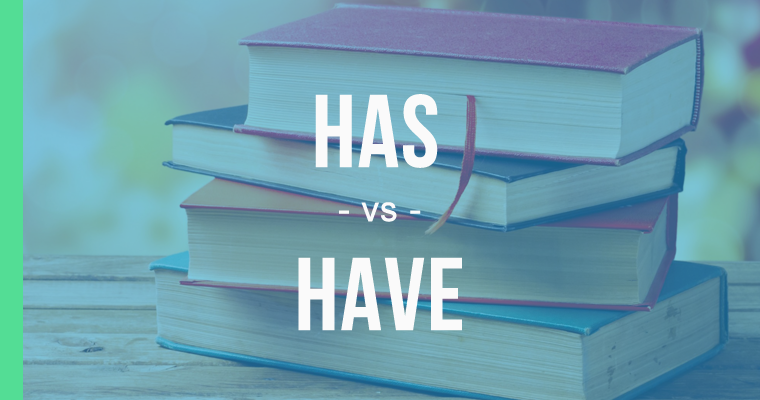Has vs. Have: What’s the Gist?
- Has is the third-person singular present form of to have. E.g., She has a cold.
- Have is the base form of the verb. It also functions as the first and second person singular present tense form. E.g., I have a cold.
Continue reading for a more in-depth discussion of these two conjugations.

Irregular verbs are one of the most confusing aspects of learning a new language. Buy, for instance, becomes bought in the simple past tense, while burst simply remains burst. How does that make sense?
For the purposes of this article, it doesn’t. English borrows heavily from Germanic and Romantic languages, and many of the conjugations retained from these languages seem strange in modern English. At any rate, these verbs don’t follow the same rules as regular English verbs, making them difficult to remember.
Have is one such irregular verb. In many tenses, it simply remains have, although in others it becomes has or had. If you aren’t sure whether to use have or has, you aren’t alone, and we’re here to help.
What is the Difference Between Has and Have?
In this post, I will discuss the differences between have and has. As always, I will be sure to include several example sentences to demonstrate their use in context.
I will also use a mnemonic device that will help you choose either has or have in a way that preserves subject-verb agreement.
How to Use Has
Has definition: Has is the third person singular present conjugation of the verb to have. Have is also used as an auxiliary verb.
Here are a few example sentences,
- “Do not share your drink with James; he has a nasty cold,” warned James’s mother.
- “Emma, the cat has your cheeseburger!” exclaimed Petrov.
- “This show has officially jumped the shark,” said the TV critic.
Since has is used in the third person singular, it will be paired with the pronouns he, she, and it.
How to Use Have
Have definition: Have is a verb. It means to possess something, and it is also used as an auxiliary verb.
Have is the first and second person singular present tense form of this verb, as well as the first, second, and third person present plural form.
See the example sentences below,
- “I have not yet begun to fight!” said the captain of the ship.
- “You have exactly five minutes before the whole space station self-destructs!” said the astronaut.
- “If Xavier has six apples, and Elgin has seven oranges, how many avocados do the Rolling Stones have?” asked Brittany’s math teacher.
Since have has more functions than has does, it is used with more pronouns.
- In the first and second person singular, have will be paired with I and you.
- In the first, second, and third person plural, have will be paired with we, you, and they.
Outside Examples of Has vs. Have
- For hours after Mr. Tillerson’s arrival in Moscow, it was unclear whether Mr. Putin would even meet with him because of the tense state of relations, which has have worsened just in the past few weeks. –The New York Times
- Jana Partners, the investor, encouraged the organic grocery chain to do a top-to-bottom reevaluation of its strategies and practices. Jana said it hoped to have discussions with Whole Foods management about everything from its real estate portfolio to customer analytics to inventory management and labor scheduling. –The Washington Post
- There has been speculation over the contract offer the Giants have on the table for defensive tackle Johnathan Hankins, who somewhat shockingly remains on the open market after finding no great demand for his services. –New York Post
Contractions From Has and Have
Both of these words are used to form contractions with the various English pronouns. Here is a quick list you can go to for reference.
Positive Contractions
- I have > I’ve
- You have > You’ve
- We have > We’ve
- They have > They’ve
- He has > He’s
- She has > She’s
- It has > It’s
Negative Contractions
- Has not > Hasn’t
- Have not > Haven’t
- Had not > Hadn’t
How to Remember These Conjugations
Have and has are two ways to conjugate the same verb, so it can be difficult to remember which is which.
- In the present tense, have is the first person singular and plural, second-person singular and plural, and third-person plural conjugation of this verb.
- Has is the third-person singular present tense.
The best way to learn the conjugations of irregular verbs is through memorization, but in the meantime, remember the phrase “Chaz has razzmatazz.” The internal rhyme should be a strong hook for has in the third person singular tense.
Summary
Is it has or have? Have is an irregular verb that means to possess.
- Has is the third-person singular present conjugation.
- Have is all the other present tense conjugations.
Both words are also used in the past and future tenses, and can both be used as helping verbs.
The phrase “Chaz has razzmatazz,” with its internal rhymes, will help you remember to use has in the third-person singular tense.
Any time you need a quick refresher on have vs. has, irregular verbs, conjugations, or other confusing writing topics, you can check this site for a refresher.
